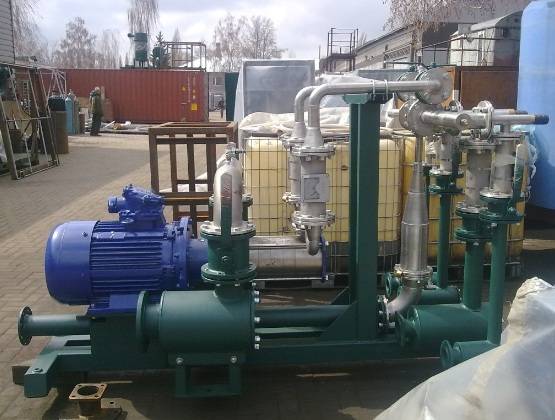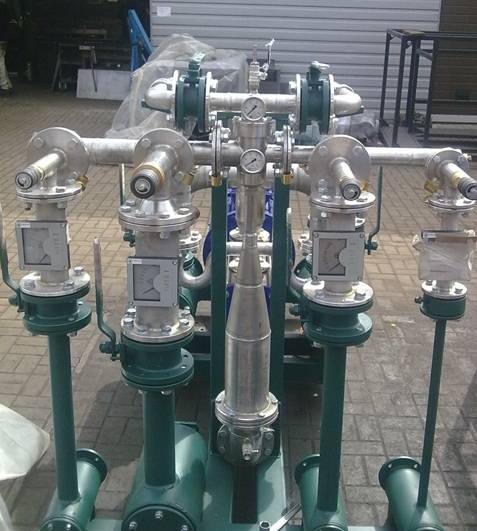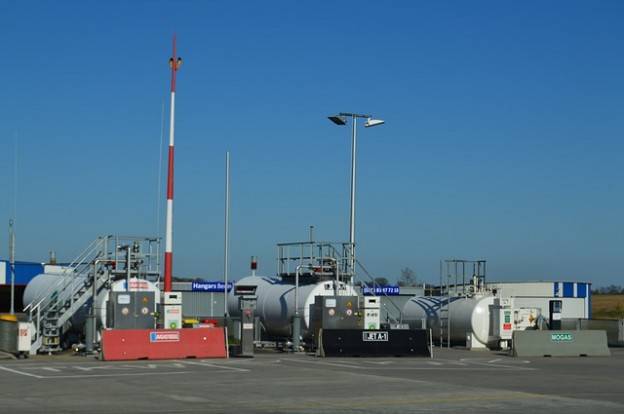Equipment used for purification (regeneration) of diesel fuel.
Primary specifications of diesel fuel
Diesel fuel is a petrochemical product, resulting from oil distillation. Mixing of hydrotreated and straight run fractions in certain proportions (compounding) defines the grade of the fuel. Usually the mix is made of straight run and primary distillation diesel fuel, obtained by catalytic cracking. The following fuel types can be produced:
- Summer diesel – for temperature above 0 °С;
- Winter diesel – for temperatures in the -20-30 °С range;
- Arctic diesel – for the lowest temperatures, to -50 °С.
Each type of fuel has a certain regulated amount of sulfur and sulfuric compounds and a certain freezing point.
Besides, there are many various parameters and specifications of diesel fuel: fraction content, kinetic viscosity, distillation temperature, cetane number, thickness at 20°С, iodine number, filtration coefficient, weight content of sulfur and sulfuric compounds, resin concentration, solid particle content, filtration temperature, freezing point, chemical stability, acidity, flashpoint, carbonization, ash content etc. Let us look at the primary specification in more detail.
- Cetane number (anti-knock stability) defines operation of the engine in terms of diesel fuel ignition and combustion. Cetane number determines power, smoke and noise of an engine. Anti-knocking stability or cetane number reference is cetane or n-hexadecane. Cetane number of cetane is 100, while the same for alphamethylnaphtalene is 0. Diesel fuel cetane number is in the range of 40 to 50 usually. In essence, this number signifies ignition delay (the time from fuel injection into the cylinder to fuel ignition). A higher cetane number means less ignition delay, i.e. better fuel combustion. Higher cetane number reduces the environmental impact of the exhaust. However, a cetane number above 60 does not imptove engine power. In turn, diesel fuel with lower cetane number is easier to produce, so in practice diesel fuel is produced with cetane number of 40 – 45. It is defined similarly to the octane number of gasoline, that is, using motor or lab method. Technologies exist which allow to correct cetane number.
- Density and viscosity of diesel fuel define the process of evaporation and formation of mix in the motor.
- Low temperature properties of diesel fuel (filtration point, pour point, cloud point) are also important. As far as pour point is concerned, it is usually around -10 °С for summer fuel and at least -35 °С for winter fuel. Cloud point is usually somewhere around -5 °С.
- Chemical stability of diesel fuel is its ability to resist oxidation in storage. Oxidation causes formation of sediment in the fuel tank; this problem can be resolved by special additives.
Nonetheless, quality of the fuel is defined by more than the above. Water and solid particles in fuel have an adverse effect. The simplest solution to that is to fill the tank only at reputable gas station chain locations. Such companies only purchase high wuality products to guarantee stable fuel quality to the end user.
Methods of diesel fuel purification:
The following methods are used for improvement of diesel fuel:
Purchase of diesel fuel of doubtable quality is rarely a good idea, and filtration and settling may be no avail, since it does require time, experience and equipment.
Fuel filtration is very important. Every time when the tank is filled, dust may enter the fuel tank; this dust can significantly damage the friction parts of an engine and fuel supply lines. Dust through nozzles may enter the cylinders and contaminate nozzle channels. This will lead to a drop in engine power due to insufficient fuel supply to the combustion chamber. Fuel filter is a simple device. It consists of a case with a filter element, usually made of paper, cellulose or synthetic fibers. Filters have different capabilities and application ranges. It is important to select the correct filter, otherwise the filter may have no effect. More universal filters are able to trap water beside solid particles contained in the fuel. When using such filters, it is important to observe them. If the filter becomes saturated with water, it will cease to let through the fuel, and unfiltered fuel will go to the engine and cause all sorts of problems and possible damage to the engine. Filter selection is important. The simplest advice is to purchase only filters made by reputable manufacturers. Sometimes, a new product is offered, in which case it is best to request documentation on the filter and study them. Some filters come with specification which are just too good. This should also be a warning sign.
Separation is similar to filtration, but more reliable. When diesel fuel is highly contaminated, regular filters cannot purify it completely. This is where separators come in handy. These devices can remove any amount of contaminants from the fuel.
Just like filters, separators can remove both solid particles and water. Unlike filter, however, separators are more complex. There are two types of separators: mechanical and chemical. Separators remove water and contaminants from the fuel and deposit them at the bottom of the purifier. A special Aquacon paper is often used in separators; this paper can stop a large volume of water emulsion. A filter only needs replacement, but separators require maintenance. It is usually enough to wash the separator and clean the bottom, where contaminants are deposited. Such simple scheduled maintenance can bring the separator back in action in no time.
Equipment used for purification, color lightening (regeneration) of diesel fuel
GlobeCore present proven, effective solution for purification, lightening, sulfur and aromatic removal (separation of diesel fuel).



